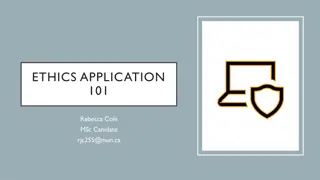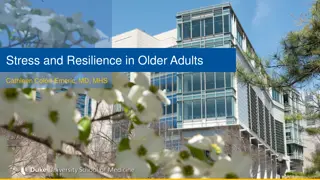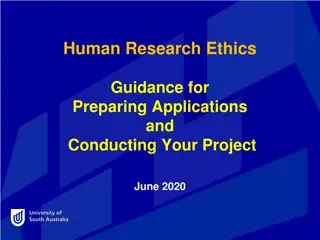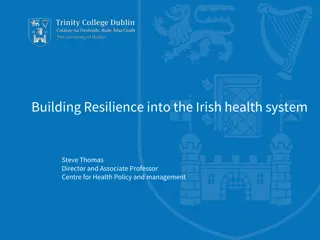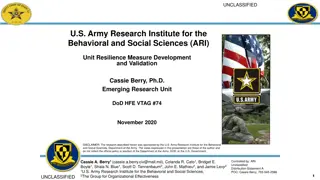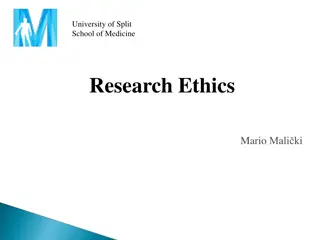Challenges and Resilience in COVID-19 Research Ethics at UNMC
Reflecting on the personal narratives of IRB professionals at UNMC during the COVID-19 pandemic reveals the intense challenges faced in balancing urgency with ethical research standards. Stories of panic, pressure, overlapping studies, and rapid turnaround shed light on the complexities of navigating research ethics in times of crisis.
Download Presentation

Please find below an Image/Link to download the presentation.
The content on the website is provided AS IS for your information and personal use only. It may not be sold, licensed, or shared on other websites without obtaining consent from the author. Download presentation by click this link. If you encounter any issues during the download, it is possible that the publisher has removed the file from their server.
E N D
Presentation Transcript
Personal Narrative and Personal Narrative and Research Ethics Research Ethics UNMC, September 2023 Gianna McMillan, D. Bioethics, MFA Bioethics Institute at Loyola Marymount University
My experience with narrative IRB stories about COVID Research Analysis and reflection
Narrative Inquiry in Bioethics Personal stories about health care issues and commentaries by experts in relevant fields that discuss bioethical themes woven throughout the collection. https://nibjournal.org/voices/resea rch-on-covid19/
Edith Paal IRB Director Our standard practice, when emergencies hit, is to allow ourselves about 8 seconds to panic. Then, once that is out of our system, we settle into work. COVID, we now know, merited a bit more than 8 seconds of panic Walter Dehority IRB Chair panicked physicians, patients and media outlets turned to the research community for answers desperately hoping for cures, vaccines, and preventative measures Stefanie Juell Assoc. Director of IRB Education and Compliance staff members were on the verge of tears some even considered quitting because these(mostly women) truly felt their lives were at stake because they were physically present in the office. a drowning person will reach for any lifeline thrown their way, whether or not that line is secure.
Gabrielle Rebillard HRPP Director I got pulled into countless meetings about closing the University on a temporary and then semi- permanent basis. This morphed into committees and sub-committees about ramping down and ramping up research. Walter Dehority We wanted to act but did the medical community really need 104 national trials of hydroxychloroquine that April (all presumably IRB approved, two from our institution), many of which were single-site, underpowered, or uncontrolled studies? Sara Griffin IRB Manager Most of the dilemmas I faced while reviewing COVID-related studies was the seemingly endless overlapping of research. Hallie Kassan HSP Director We needed time rapid turnaround The struggle was giving IRB members enough time to perform an adequate review.
Jennifer Randles - IRB Chair The pandemic reinforced deeply entrenched research inequalities but also presents an opportunity to consider the benefits, risks and trade- offs of virtual data collection. Stefanie Juell I could not allow myself to succumb to the pressure of desperation I had to stick to what I knew Respect for personhood, beneficence, and justice are collective promises that reflect our core humanity. Adhere to principles that have always been a guide for your work. COIVID required researchers to reassess the unique physical, psychosocial, emotional, social, and identity risks to human subjects these risks were and are still largely unknown. Gigi McMillan this new situation does not mean we need new rules. The old rules our existing tradition of ethical research practice are still valid The answer is not to invent new strategies, but to wield, with confidence, the tools that have already stood us good stead.
Narrative Analysis Setting Conflict We created a running list of pandemic research FAQs Resolutions
Analyze Consider Discuss Feel Reflect Share Appreciate Envision Plan Protagonists HEROES
We use the cognitive and emotional components of story to process events and make nuanced plans.















